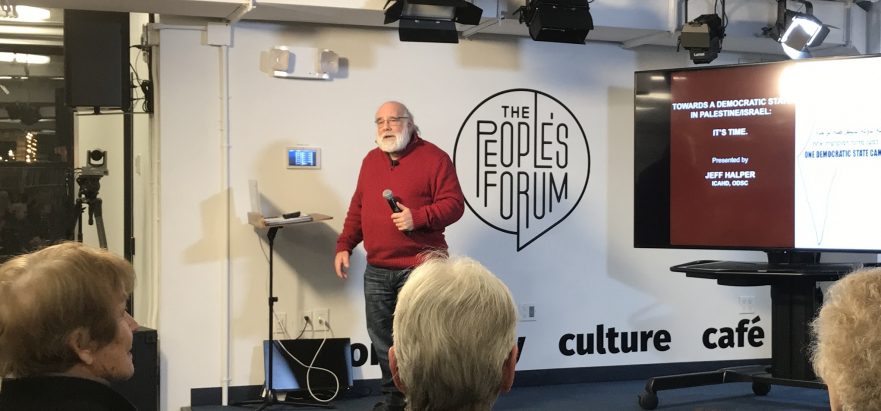Veteran Jewish-Israeli activist Jeff Halper brought his current US speaking tour to New York City on February 5, when he discussed the “One Democratic State” campaign with which he’s been affiliated at a gathering organized by the local chapter of Jewish Voice for Peace with co-sponsorship from NYU-SJP, NYU-JVP, Codepink, and others.
Discussion and exploration of various “one-state” options for historic Palestine has proliferated in the past few years, as the sheer impossibility of separating the areas of Palestine occupied in 1967 from those occupied in 1948 has become increasingly evident. Some very significant contributions to this discussion have been published over the past year on the news site Mondoweiss, including pieces by (or about): Phil Weiss (1/17/18), Jonathan Ofir (March 1), Jeff Halper himself (May 3) Naji El Khatib & Ofra Yeshua-Lyth (June 25), Yousef Aljamal et al. (August 4), Ahmed Abu Artema (August 17) and Awad Abdelfattah (August 29).
The longing for a single sovereign state in Palestine is, of course, one that goes back a long way in Palestinian history, as shown in the numerous actions Palestinians took against British colonialism, Zionist settler colonialism, and all attempts (including, shamefully, at the United Nations) to partition the land between its legitimate, indigenous residents and the Zionist-colonial settlers.
In the post-1948 era, the strongest early political goal of the Palestine Liberation Organization was the one defined in 1968 for a single “secular, democratic state” in all of historic (Mandate-era) Palestine. It was only later, in the mid-1970s, that leaders of the PLO started to move slowly toward the idea of creating a Palestinian “national authority” in the areas occupied in 1967, a project that by 1988 had transmogrified into their embrace of a two-state solution… However, there have always remained powerful currents in Palestinian society that have refused to accept the legitimacy of the Israeli state created in 1948. Those currents, it is fair to say, are strongest among the Palestinians whose families were displaced in the fighting of 1947-49 and who have remained as refugees– many of them exiled from their homeland altogether, and many stateless– for the 70 years since then.
So this idea of a single state in historic Palestine is by no means a new one– and neither ( as it is clear just by glancing at the list of Mondoweiss articles above) are the debates and discussions over how this state should be organized. Indeed, over the past decade there have been numerous different proposals formulated and promulgated on this topic.
Yet Halper’s February 7 event reflected, sadly, very little of the richness and intensity of this discussion. That was a pity– especially since Mondoweiss is a resource that many of the people in the audience (and also, Halper himself) should be expected to read and follow with some regularity. By the way, the pages in Mondo on this topic are worth reading not just for the articles themselves, but also for the discussions that takes place in their Comments sections…
The richest and most broad-ranging of the Mondoweiss pieces listed above is this one, by Yousef M. Aljamal and three co-authors. It’s titled “Which One Democratic State?” and it surveys and comments on many of the plethora of one-state proposals that have been promulgated over the past decade. Indeed, the first three paragraphs of this article provide an extremely helpful guide (with hyperlinks) to a whole range of these proposals.
Then, after that Preamble, the authors move to an intense engagement with “the Halper Proposal”– the text of which Halper had, as noted above, published in full on Mondoweiss just three months earlier. (To find the actual text of the proposal on that page, you’ll need to scroll down quite a way. Or, you can find it on the ODS Campaign’s website, here.)
Of the three people with whom Aljamal co-authored that article, one, Samir Abed-Rabboo, is (like Aljamal himself) someone who grew up in a Palestinian refugee camp; Ghassan Olayan is a native of 1967-occupied Bethlehem; and Blake Alcott is a Swiss social-justice activist living in Istanbul.
In their consideration of Halper’s One Democratic State proposal, firstly they express their welcome for it. Then, they helpfully go on to outline eight points of their agreement with it– and also, their areas of disagreement.
The first disagreement they list is this:
We disagree with Halper’s view that collectives should have constitutional rights. He writes: “The ODSC promotes a one-state concept that is both democratic and just but that also acknowledges… the collective rights of the peoples living in the country, Palestinian Arabs and Israeli Jews.” He sees a “the fundamental reality that two national groups – Palestinian Arabs and Israeli Jews – inhabit the country.” The ODS Campaign’s “Program” provides that “the Constitution will also protect the collective rights of Palestinian Arabs and Israeli Jews to freedom of association.”
In contrast, we believe it is strong enough and sufficient to recognize fundamental individual rights, two of which are the rights of free association and free expression. Any legal standing of associations, groups, companies or “collectives” is derivate – reducible to individual liberties. It is category mistake, moreover, to classify “freedom of association” as a “collective right”; in all constitutions known to us this is an individual right. We believe such collectives can be a euphemism for sectarianism and even lay a platform for the continued socio-economic superiority of one group.
They also wrote:
We are also skeptical about placing emphasis at this stage on what Halper writes of as “reconciliation,” a “new society,” “mutual trust,” “building a shared civil society” and even “economic justice.” If such thoughts are now pursued, we must of course say with no ifs and buts that Zionism threw the first stone and that the Palestinians have done nothing requiring forgiveness; there is no symmetry of reconciliation. We furthermore worry that by aiming beyond the political into these realms of feeling and socio-economics is biting off more than the ODS movement can chew. To put it perhaps too provocatively, we are willing now to settle for a less ambitious principle of “Hate me, don’t hurt me.” That is, harmony and forgiveness would be wonderful, but mainly we want a just solution and peaceful behavior.
A final issue concerns the danger of treating Palestinians paternalistically. After affirming right of return Halper asks “how do we prevent the refugee population, traumatized, impoverished, severely under-educated and unskilled, from becoming an underclass in their own country?” First, the unskilled, undereducated Palestinian refugee is largely a myth. Second, we believe that once the political rights and emotional stability of living in their homeland have been restored, Palestinians will be perfectly capable of fending for themselves, the more so as they would share relatively open borders with an Arab region where Arabic is the dominant language.
The whole of Aljamal et al‘s critique of the Halper Plan is definitely worth reading. Theirs is a thoughtful, intellectually sophisticated critique, that is worth engaging deeply with.
…Which is what several thoughtful people did in the “Comments” section at the foot of that page… including Jeff Halper himself. His response to the article was then met with a short series of responses to him from Ghassan Olayan.
 So that was a fabulous discussion that was published there on Mondoweiss last August!
So that was a fabulous discussion that was published there on Mondoweiss last August!
But Halper made zero reference to those (or any other) critiques of his plan, or to any other portion of the broad, ongoing discussion over various One State formulas…
And nor did he call out by name, to provide some acknowledgement to, any of the numerous Palestinian “co-founders” of the plan he was (re)presenting at the NYC event, whose names were listed on a handout he distributed. (Click on the image at right to read the whole list.)
The names listed there include many very notable ones from the Palestinian community, such as Diana Buttu, Dareen Tatour, Mazin Qumsiyeh, Ramzy Baroud, Hatem Kanaaneh, etc. Mentioning them name and noting any contributions they had made to the formulation of the proposal would not only have been a gracious gesture but would also have strengthened the sense that this is a well-grounded initiative that might have some political legs.
I also, to be honest, wish that Jewish Israelis working on any Palestinian justice issue would take the time to name and acknowledge the institutional privilege they enjoy in Israel simply by virtue of their being Jewish– something that Miko Peled, a very prominent Jewish-Israeli advocate of a single democratic state in Palestine, is nearly always at pains to do. This requirement should apply doubly or trebly, I think, to Jewish Israelis who, like Halper, chose to migrate to Israel as adults, taking full advantage of the massive package of Jewish-privilege perks on offer there, while in most cases also keeping the citizenship of their land of birth… And that, at a time when many million Palestinians are still denied the right to return to their home properties in historic Palestine, to have any of those “Jews-only” perks on offer in Israel, or even, in a large proportion of cases, to have any stable citizenship status at all.
So it was certainly interesting to hear Jeff Halper openly describing Zionism in his talk to a New York audience as a settler-colonial project (something Maxime Rodinson did 46 years ago), and to hear him call for its end and its replacement with a single, egalitarian, and democratic polity west of the Jordan River. But I suspect that, to be successful, any “One Democratic State” project needs the people promoting it to follow the leadership of, and give some real respect to, the currently non-Jewish-privileged people who will (as Halper noted) be the majority of the future state’s citizens– and who will undoubtedly, for many years to come, continue to be the people who bear the cruelest brunt of the quotas of punishment inflicted on all who struggle for equality and equal rights in the land of historic Palestine.

